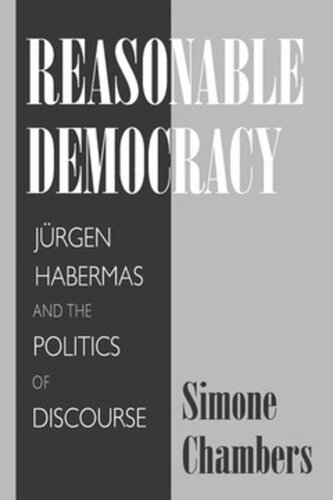

Most ebook files are in PDF format, so you can easily read them using various software such as Foxit Reader or directly on the Google Chrome browser.
Some ebook files are released by publishers in other formats such as .awz, .mobi, .epub, .fb2, etc. You may need to install specific software to read these formats on mobile/PC, such as Calibre.
Please read the tutorial at this link: https://ebookbell.com/faq
We offer FREE conversion to the popular formats you request; however, this may take some time. Therefore, right after payment, please email us, and we will try to provide the service as quickly as possible.
For some exceptional file formats or broken links (if any), please refrain from opening any disputes. Instead, email us first, and we will try to assist within a maximum of 6 hours.
EbookBell Team

5.0
108 reviewsIn Reasonable Democracy, Simone Chambers describes, explains, and defends a discursive politics inspired by the work of Jürgen Habermas. In addition to comparing Habermas's ideas with other non-Kantian liberal theories in clear and accessible prose, Chambers develops her own views regarding the role of discourse and its importance within liberal democracies.Beginning with a deceptively simple question—"Why is talking better than fighting?"—Chambers explains how the idea of talking provides a rich and compelling view of morality, rationality, and political stability. She considers talking as a way for people to respect each other as moral agents, as a way to reach reasonable and legitimate solutions to disputes, and as a way to reproduce and strengthen shared understandings. In the course of this argument, she defends modern universalist ethics, communicative rationality, and what she calls a "discursive political culture," a concept that locates the political power of discourse and deliberation not so much in institutions of democratic decision-making as in the type of conversations that go on around these institutions. While discourse and deliberation cannot replace voting, bargaining, or compromise, Chambers argues, it is important to maintain a background moral conversation in which to anchor other activities.As an extended case study, Chambers examines the conversation about language rights that has been taking place for more than twenty years in Quebec. A culture of dialogue, she shows, has proved a positive and powerful force in resolving some of the disagreements between the two linguistic communities there.